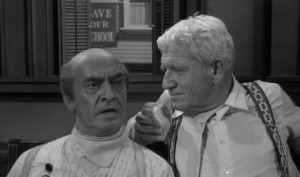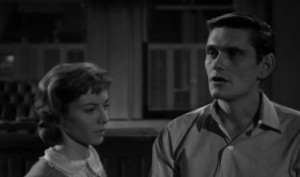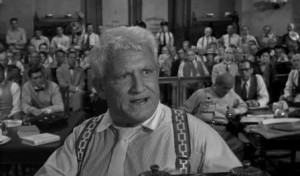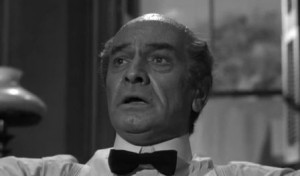 In the climax of the trial, Drummond unexpectedly calls Brady as a witness—as an authority on the Bible. Against Brady’s literal interpretation of that book, Drummond enumerates some puzzling, illogical and science-defying points.
In the climax of the trial, Drummond unexpectedly calls Brady as a witness—as an authority on the Bible. Against Brady’s literal interpretation of that book, Drummond enumerates some puzzling, illogical and science-defying points.
What about, for example, the cataclysmic consequences of Jonah having the sun stand still? And if, in the beginning, there were only Adam and Eve, where did his wife come from? According to Brady, the holy men and women of the Bible were begot through Original Sin! “Does that make them any less holy?” Drummond asks. Also, Brady informs the court that the earth is not as old as scientists have said, that Bishop James Ussher determined, as Brady pontificates, that “The Lord began the Creation on the twenty-third of October in the year 4004 B.C. at—uh, at 9 a.m.!”
The crux of Drummond’s cross-examination is getting Brady to admit that the length of a day—as in the Biblical six days it took to create the world—was not necessarily a twenty-four-hour day. “A day,” Drummond then counters, “could have been thirty hours! Or a month! Or a year! Or a hundred years! Or ten million years!” In the film, as in Tennessee in 1925, although Brady was discredited by the crowd, the jury ruled against Cates, ordering him to pay a $100 fine. (Darrow offered to pay it.)
 At times, the film alters the play, at others it adds to it. Added is Hornbeck’s meeting Drummond at the bus and walking him through Hillsboro—“The buckle on the Bible belt,” Hornbeck moans—to the hotel. The lawyer is cursed by some townspeople but welcomed by students of Cates’ biology class, providing some humor and further negative jabs at fundamentalism.
At times, the film alters the play, at others it adds to it. Added is Hornbeck’s meeting Drummond at the bus and walking him through Hillsboro—“The buckle on the Bible belt,” Hornbeck moans—to the hotel. The lawyer is cursed by some townspeople but welcomed by students of Cates’ biology class, providing some humor and further negative jabs at fundamentalism.
In the play, Drummond delivers a lengthy courtroom monologue to Cates about his memory of a rocking horse he saw in a store window as a child. In the film, the scene is switched to the porch of the Mansion House and Brady replaces Cates with new dialogue, a resplendent duo for the two great actors. One wonder of the scene, aside from composer Ernest Gold’s “rocking horse” tune and some apropos Mickey-Mousing, is cinematographer Ernest Laszlo’s uncut take, from Brady kissing Sarah good night at the hotel screen door, through the scene of the two men conversing in rocking chairs, to Drummond’s disgruntled departure, a good three minutes of film time.
 The scene, dialogue and performances, especially by the ultra-natural Spencer Tracy, is one of the highlights of the movie. “I was seven years old,” Drummond relates, “and a very fine judge of rocking horses. Golden Dancer had a bright red mane, blue eyes, and she was gold all over, with purple spots. . . . But—let’s see, it wasn’t Christmas, must’ve been my birthday—I woke up in the morning and there was Golden Dancer at the foot of my bed! . . . I jumped into the saddle and started to rock— And it broke. It split in two! The wood was rotten. The whole thing was put together with spit and sealing wax—all shine and no substance. And that’s how I feel about that demonstration I saw tonight, Matt. A-a-a—! As long as the prerequisite for that shining paradise is ignorance, bigotry and hatred—I say to hell with it!”
The scene, dialogue and performances, especially by the ultra-natural Spencer Tracy, is one of the highlights of the movie. “I was seven years old,” Drummond relates, “and a very fine judge of rocking horses. Golden Dancer had a bright red mane, blue eyes, and she was gold all over, with purple spots. . . . But—let’s see, it wasn’t Christmas, must’ve been my birthday—I woke up in the morning and there was Golden Dancer at the foot of my bed! . . . I jumped into the saddle and started to rock— And it broke. It split in two! The wood was rotten. The whole thing was put together with spit and sealing wax—all shine and no substance. And that’s how I feel about that demonstration I saw tonight, Matt. A-a-a—! As long as the prerequisite for that shining paradise is ignorance, bigotry and hatred—I say to hell with it!”
Just before the final session of the trail, a lengthy scene is added between Hornbeck and Drummond, the two sharing a room at the hotel. The cynical newspaper man gets in another poke at mankind’s lowly status: “Ah-h—Henry! Why don’t you wake up? Darwin was wrong! Man’s still an ape, his creed still a totem pole. When he first achieved the upright position, he took a look at the stars and thought they were groceries belonging to a bigger creature. That’s how Jehovah was born.” When Drummond says he needs a miracle for the trial next day, Hornbeck tosses him a book full of miracles. The lawyer, lying in bed, catches the hotel Bible, and when Hornbeck turns back to him with a drink, Drummond is smiling, his fingers interlaced over the book on his stomach—he has that idea of calling Brady to the stand.
 At times, as has been suggested, director Kramer overstates his position: the fundamentalist characters are too much caricatures—too countrified, too ignorant, too bigoted, too intolerant, and unrealistically all cut from the same cloth. The film’s slant in favor of evolution makes more than a little simplistic what seems obvious and logical to many people. It’s just because this debate between creationism, with its literal interpretation of the Bible, and evolution has continued so long, and remains ongoing, that there is possibly—just possibly—respectable, and perhaps respectful, reason for a broader view. Could it be that those with Faith have it right?—
At times, as has been suggested, director Kramer overstates his position: the fundamentalist characters are too much caricatures—too countrified, too ignorant, too bigoted, too intolerant, and unrealistically all cut from the same cloth. The film’s slant in favor of evolution makes more than a little simplistic what seems obvious and logical to many people. It’s just because this debate between creationism, with its literal interpretation of the Bible, and evolution has continued so long, and remains ongoing, that there is possibly—just possibly—respectable, and perhaps respectful, reason for a broader view. Could it be that those with Faith have it right?—
“Right,” however, shouldn’t ever mean totalitarianism, or abuse, as Henry Drummond warns: “Can’t you understand, that if you take a law like evolution and you make it a crime to teach it in the public schools, tomorrow you can make it a crime to teach it in the private schools? And tomorrow you may make it a crime to read about it. And soon you may ban books and newspapers. And then you may turn Catholic against Protestant, and Protestant against Protestant, and try to foist your own religion upon the mind of man.
“If you can do one, you can do the other. Because fanaticism and ignorance is forever busy, and needs feeding. And soon, your honor, with banners flying and with drums beating, we’ll be marching backward—backward!—through the glorious ages of that sixteenth century when bigots burned a man who dared bring enlightenment and intelligence to the human mind.” This is the best speech in the movie—surprisingly, not in the play—and hits the nail of Truth on the head.
Drummond has offered a warning, here of the mindless prosecution of creationism, but, clearly, there’s the other extreme, of a one-only enforcement of evolutionism, or any other single concept, in any form, that seeks to control the mind of man.